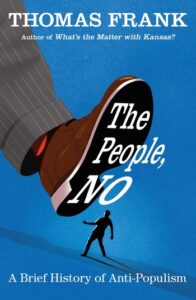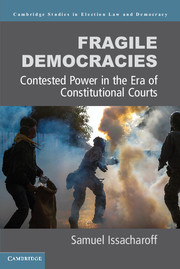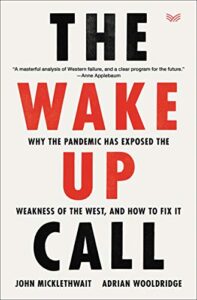Richard Pildes opened his 2004 article, “The Constitutionalization of Democratic Politics,” by proclaiming that this was “The Age of Democracy”…. Fast-forward a mere decade…. Samuel Issacharoff found a much more mixed picture when he evaluated the state of democracy in a group of countries that had emerged from autocratic rule or conflict in the 1990s and early 2000s. His book Fragile Democracies: Contested Power in the Era of Constitutional Courts examined what led democracy to flourish in some of these countries and to wither or perish in others, and it asked the question: how could you have confidence that one fairly contested election would be followed by another?
 Today, seemingly every well-educated person in America and Europe knows that populism is the name we give to mass movements that are bigoted and irrational; that threaten democracy’s norms with their anti-intellectual demagoguery, notes Thomas Frank, the author of The People, No: A Brief History of Anti-Populism. Some thinkers define populism as a catch-all noun in which ordinary people refuse to genuflect before social standing or scholarly attainment, he writes for The Guardian:
Today, seemingly every well-educated person in America and Europe knows that populism is the name we give to mass movements that are bigoted and irrational; that threaten democracy’s norms with their anti-intellectual demagoguery, notes Thomas Frank, the author of The People, No: A Brief History of Anti-Populism. Some thinkers define populism as a catch-all noun in which ordinary people refuse to genuflect before social standing or scholarly attainment, he writes for The Guardian:
As Daniel Bell put it in The End of Ideology, “populism goes further” than merely rejecting economic status: “That some are more qualified than others to assert opinions is vehemently denied.” An eminent sociologist, Edward Shils, asserted in 1956 that the populist “denies autonomy” to any institution of government. Populists, he wrote, despise the justice system and politicians, scorn learning and deny the right of privacy. More desirable by far was a deferential order in which the public accepted hierarchy. Also: “a sense of affinity among the elites”.
 “It is odd, and highly dispiriting, to have to engage this question so soon after democracy seemed ascendant as never before,” Issacharoff wrote in “Democracy’s Deficits,” NYU’s Orey adds:
“It is odd, and highly dispiriting, to have to engage this question so soon after democracy seemed ascendant as never before,” Issacharoff wrote in “Democracy’s Deficits,” NYU’s Orey adds:
A durable democracy, Issacharoff notes in Fragile Democracies, rests on a complex interplay among popular sovereignty, political parties, stable institutions of state, and vibrant organs of civil society…..Populist impulses shorten the time frame and turn everything into a binary choice, a political life at the knife’s edge.” In “The Inherent Authoritarianism in Democratic Regimes,” Pildes has described the temptation of those in power to manipulate the democratic process to entrench themselves and their allies in power.
 Democracies have a capacity for innovation and reinvention that authoritarian states struggle with, a new book suggests.
Democracies have a capacity for innovation and reinvention that authoritarian states struggle with, a new book suggests.
 Today, seemingly every well-educated person in America and Europe knows that populism is the name we give to mass movements that are bigoted and irrational; that threaten democracy’s norms with their anti-intellectual demagoguery, notes Thomas Frank, the author of
Today, seemingly every well-educated person in America and Europe knows that populism is the name we give to mass movements that are bigoted and irrational; that threaten democracy’s norms with their anti-intellectual demagoguery, notes Thomas Frank, the author of  “It is odd, and highly dispiriting, to have to engage this question so soon after democracy seemed ascendant as never before,” Issacharoff wrote in “
“It is odd, and highly dispiriting, to have to engage this question so soon after democracy seemed ascendant as never before,” Issacharoff wrote in “





